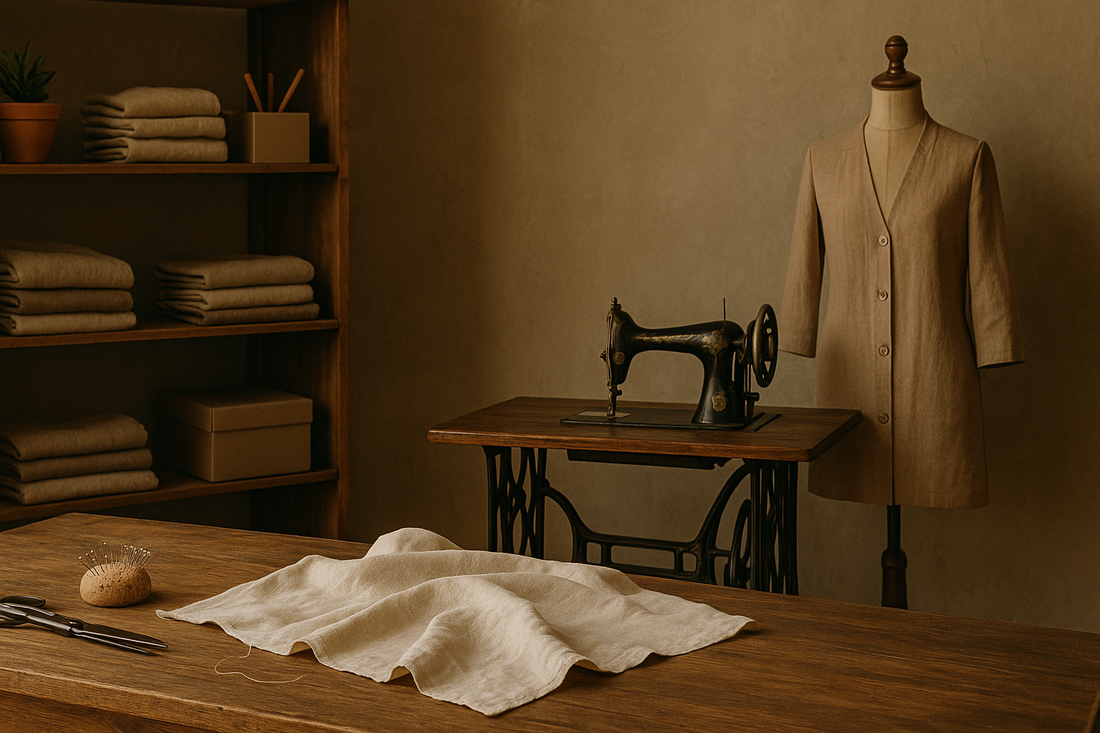
Made in Italy between myth and truth: fashion isn't to blame, but those who work in it are.
Share
 Lately, more and more articles have denounced the crisis in the Italian fashion system. Some have even featured provocative headlines:
Lately, more and more articles have denounced the crisis in the Italian fashion system. Some have even featured provocative headlines:
“ Made in Italy is now just a fairy tale .”
But is it really that simple?
No. The truth – as often happens – is more nuanced .
The point isn't whether Made in Italy still exists or not. The point is to understand what it really means today . And above all, to take responsibility for how we talk about it, use it, and inhabit it .
What is Made in Italy really?
From a regulatory perspective, a product can be defined as Made in Italy if the last substantial phase of its manufacturing takes place in Italy.
This means that — even if much of the materials or manufacturing processes take place elsewhere — the label can still be legally used.
A cold, technical definition, distant from the emotional and cultural one that the world (and we ourselves) associate with the concept of "made in Italy":
craftsmanship, beauty, care, passion, uniqueness.
Yet, this disconnect between technical definition and perceived reality is only part of the problem.
 Fashion isn't to blame. But those who work in it are.
Fashion isn't to blame. But those who work in it are.
When we talk about the crisis of Made in Italy, or more generally the crisis of the fashion industry, we risk pointing the finger at "fashion" as if it were an impersonal force, an autonomous entity. But fashion is a language , an opportunity , a form of expression .
The real crux is how it's used. And by whom.
If today many perceive the world of fashion as cold, snobbish, inaccessible, distant… the fault is not fashion itself.
It belongs to those who work there.
Of those who communicate exclusively. Of those who only look at the numbers. Of those who choose the easiest route, the one that works "to sell" but lacks substance.
It is precisely those in the industry who have made fashion, over the years, less empathetic and more repellent.
Once upon a time, fashion was rigor and poetry, discipline and dream.
Today — too often — it has become a show and superficiality.
Yet, it's not fashion's fault. It's ours.
Those who work in fashion have the power to make it human, accessible, and real again .
Or to continue to defend a glossy image that is slowly losing its meaning.

Made in Italy isn't a logo. It's an attitude.
And this is where we return to the heart of the matter.
Made in Italy is not a golden seal to stick on a package.
It's a way of thinking , of producing , of experiencing work.
True Made in Italy still exists, but it's not everywhere . You won't necessarily find it in the most luxurious storefronts or from the most famous names. It lives in the details.
In those invisible hand-sewn seams.
In choosing a natural fabric instead of a synthetic one.
In the time spent doing well, rather than doing quickly.
It's a culture. An ethic. A coherence.
And it is also an invitation to slow down.
 True luxury? It's time, respect, and awareness.
True luxury? It's time, respect, and awareness.
Anyone who truly desires a handcrafted, ethical garment, carefully made in Italy… must also be willing to accept its real value .
You can't want craftsmanship at the price of fast fashion.
You cannot seek authenticity without accepting expectation, complexity, imperfection.
True Made in Italy doesn't chase trends : it walks .
You find it in small workshops, in independent brands, in those who choose the path less traveled every day.
 Like ddLab , which was born from a specific urgency :
Like ddLab , which was born from a specific urgency :
making fashion with truth, with grace, with conscience.
In conclusion: Made in Italy is here, but it must be chosen. And also returned.
It's not a fairy tale. But it's not an automatic guarantee either.
It's a conscious choice , on both sides:
- from who produces
- from whoever buys.
And perhaps today, more than ever, it is also a cultural challenge .
Because we need a new way of understanding fashion: not as distance, but as relationship .
If we really want a fairer, more empathetic, more credible fashion system...
then we have to take responsibility to change it.
Not only in our methods, but in the way we present ourselves, tell our stories, and open up.
Because in the end, true quality isn't just measured in perfect stitching .
It is measured in gaze, coherence, respect .
Do you want to experience a different way of doing fashion?
If this article has made you think, come visit us in the atelier.
You'll discover that a Made in Italy brand still exists, made of hands, time, listening, and truth.
And that fashion, when it is kind, can make you feel at home.
📍 We're waiting for you at ddLab.
A place where beauty is still a serious matter. And profoundly human.
